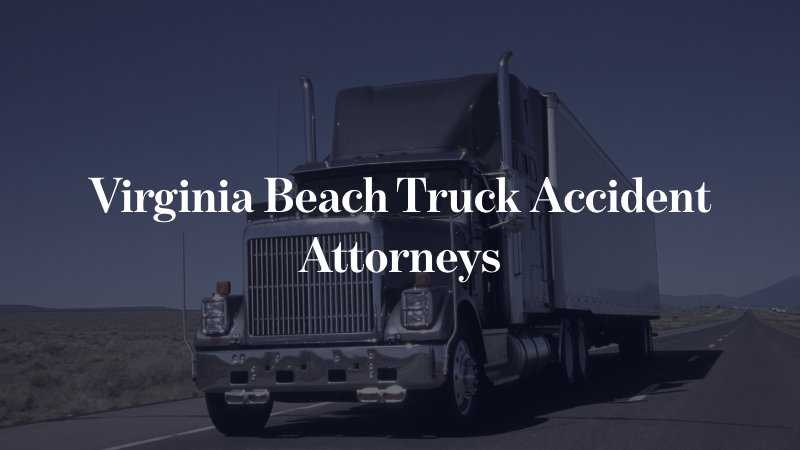Truck accidents often result in severe injuries and extensive property damage, particularly for those inside traditional passenger cars. At Shapiro, Washburn & Sharp, we are standing by to help if you or a loved one need a Virginia Beach truck accident attorney. Our team has the resources necessary to investigate these complex truck accident cases, and we are not afraid to stand up to trucking companies, their insurance carriers, or their well-funded legal teams. We know what it takes to help our clients involved in trucking accidents recover full compensation for their losses.
Why Choose Shapiro, Washburn & Sharp for a Truck Accident Claim?
- At Shapiro, Washburn & Sharp, we take a client-focused approach to every case that we handle. This means we take the time to get to know the stories of the people we work with.
- We have more than seven decades of combined legal experience and have returned significant multi-million dollar settlements from motor vehicle accidents on behalf of clients throughout Virginia.
- Our truck accident lawyers are licensed in both VA and North Carolina, published in the field of injury law, and lecture to our peers on injury law.
Our team has successfully recovered significant compensation amounts for truck accident victims, including a $5.5 million settlement on behalf of victims of truck accidents in Virginia who suffered from severe physical and brain injuries.
How Will an Attorney Help a Virginia Beach Truck Accident Case?
Claims regarding truck accidents in Virginia Beach have to be treated differently than other types of vehicle accidents. That is because there will be many other parties involved, often with significant resources at their disposal. Our personal injury lawyers in Virginia Beach know how to handle your claim.
A Virginia Beach truck accident lawyer can use their resources to obtain all evidence needed to prove liability. They will also have the ability to vigorously negotiate with insurance carriers and legal teams for the trucking companies to recover maximum compensation for their client. Whether it was a commercial truck, a large truck, or any other type of truck accidents, our lawyers can help you out.

How Much Does a Truck Accident Lawyer Cost?
At Shapiro, Washburn & Sharp, our law firm handles Virginia Beach truck accident claims on a contingency fee basis. This means that our clients will not have to worry about paying any legal fees until after we recover the compensation they are entitled to. If we do not win, our clients do not pay.
Common Causes of Truck Accidents in Virginia Beach
Data available from the Virginia Department of Motor Vehicles indicates that there were 4,953 total crashes involving commercial motor vehicles across the Commonwealth during the latest reporting year. Out of these incidents, there were 93 fatal collisions and 1,605 injury collisions. These are more fatal and catastrophic than car accidents. If you were hurt while driving, our Virginia Beach car accident lawyers can help with those cases as well.
These collisions can occur in a wide variety of ways, and they are often the result of the negligent actions of a truck driver or trucking company. Both drivers and companies have to abide by stringent state and federal regulations when it comes to operating these vehicles to stay away from truck crashes.
- Truck driver’s fault. Truck drivers can be held liable for these incidents due to a variety of reasons, including:
- Failing to abide by federal hours of service requirements
- Operating a vehicle while distracted by phones or other devices
- Operating while impaired by alcohol or drugs
- Driving the truck too fast for the conditions
- Violating other types of traffic laws
- Truck company’s fault. Trucking companies can also hold liability for these crashes. First, companies will likely be held liable for the actions of their employees. If a truck driver causes a crash, the accident liability will likely fall to the company. Additionally, truck companies can have direct liability for a vehicle accident if they:
- Fail to regularly inspect and maintain the vehicle
- Do not conduct adequate background checks or driver training
- Encourage drivers to overload the vehicles or violate hours of service
Type of Compensation Available for a Virginia Beach Truck Accident
There may be various types of compensation available to victims of truck accidents in Virginia Beach. At Shapiro, Washburn & Sharp, our truck accident attorneys work diligently to recover both “special” and “general” damages on behalf of our clients.
- Special damages. This is also referred to as economic damages and revolves around the types of compensation that are relatively calculable after a truck accidents. This includes the following expenses:
- Medical bills
- Physical therapy or rehabilitation
- Lost income
- Household out-of-pocket expenses
- Property damage expenses
- General damages. This is also referred to as non-economic damages, but these types of losses are harder to calculate. General damages are more immeasurable because they do not come with direct bills or receipts they can quantify a truck accident victim’s:
- Emotional and psychological distress
- Physical pain and suffering
- Loss of enjoyment of life
- Loss of consortium for a family member
The total amount of compensation available to track accident victims in Virginia Beach will vary depending on the circumstances surrounding each claim. Some of the factors that can affect total compensation amounts include the severity of the injuries, the level of property damage, how long it takes a person to recover, the level of a victim’s pain and suffering, and more.
We advise you to wait and call an experienced trucking accident attorney before you settle with any insurance company. Insurance companies will most likely give you the lowest settlement they can get away with.
Time Limit for Filing a Truck Accident Claim in Virginia

It is crucial to understand that there is a limited amount of time to file these claims in court. The Virginia personal injury statute of limitations is two years from the date an injury occurs. This means that truck accident victims in Virginia Beach have a two-year window with which to file a lawsuit against the alleged negligent driver or company. If they fail to file a lawsuit within this time frame, they will likely lose the ability to recover the compensation they need.
Call a Virginia Beach Truck Accident Attorney Today
If you or somebody you love has been injured in an accident caused by the actions of a truck driver or trucking company in the Virginia Beach area, the team at Shapiro, Washburn & Sharp is here to help. We have the resources necessary to investigate every aspect of these claims. Our team will not back down from aggressive insurance carriers or trucking companies as we work to secure total compensation on behalf of our clients. When you need a Virginia Beach truck accident attorney, you can contact us for a free consultation by filling out the contact form below or calling us at (833) 997-1774.
